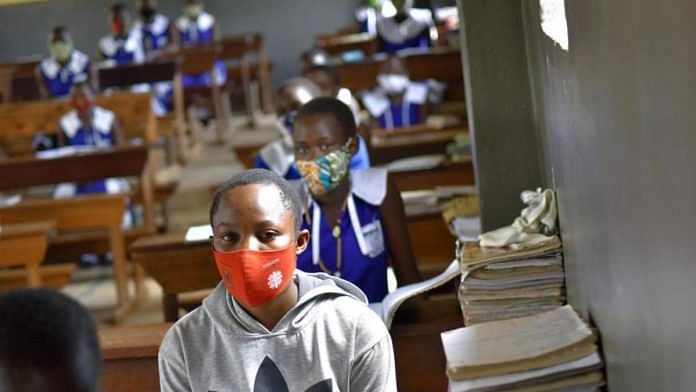New Delhi: As experts continue to monitor the threat from Omicron, Covid-19 infections continue across the world. The total number of cases reported worldwide has reached 26,74,49,928, with 52,87,883 deaths.
Countries are trying to slowly return to a pre-Covid set-up, with precautions in place to check the spread of the virus.
While Uganda is set to withdraw its record-long school shutdown, it is yet uncertain how many students will return to classrooms. Romania, too, is easing Covid-19 restrictions, as it recovers from a deadly wave of infections in the last two months. Meanwhile, hospitals in South Korea face intense pressure as serious cases rise.
ThePrint brings some of the important global stories on the pandemic.
Also Read: Why the pandemic’s invisible deaths needs to be counted
Uganda to lift 80-week school shutdown
Uganda is gearing up to reopen schools in January, after an 80-week school shutdown, but there is uncertainty as to how many students will return to classrooms, Al Jazeera reported Tuesday.
According to the National Planning Authority (NPA) — a semi-autonomous national development planning organisation under the Uganda government — roughly 30 per cent of students are expected to not return to school, due to teen pregnancy, early marriage and child labour.
UNICEF data shows that, from March 2020 to June this year, the African nation reported a 22.5 per cent jump in pregnancies among girls aged 10 to 24.
Uganda National Teachers’ Union (UNATU) General Secretary Filbert Baguma has long criticised the school shutdown — the world’s longest, according to the Al Jazeera report — saying it has done “more harm than good”.
Uganda has registered 1,27,708 Covid cases and 3,258 deaths.
Also Read: Why Peru has the highest Covid death rate in the world
South Korea faces high daily infections, hospitals under pressure
A day after South Korea announced a return to stricter Covid-19 restrictions, Prime Minister Kim Boo-kyum warned that hospitals are under major pressure amid a rise in serious cases, The Guardian reported Wednesday.
The Asian nation reported a record daily total of 7,175 new infections Wednesday, according to the report. This is the first time the country has recorded daily infections above the 7,000-mark.
The total caseload stands at 4,89,484, according to the Korea Disease Control and Prevention Agency.
People aged over 60 years comprise 35 per cent of the total caseload and 84 per cent are critically ill patients.
South Korea has reported 4,89,484 cases and 4,020 deaths.
Also Read: Omicron has higher risk of reinfection than Delta, Beta variants, Singapore’s health ministry says
Romania to withdraw night curfew, shops can stay open till 10 pm
While most of the world contemplates tighter restrictions amid the threat of the Omicron variant, Romania will ease some Covid-19 restrictions Wednesday, reported Reuters.
This will include stopping a night curfew and an obligation to wear face masks outdoors ahead of winter holidays, said officials. Eateries and shops can now close at 10 pm instead of 9 pm. Also, entry to most non-essential public venues will be allowed for vaccinated persons, those who have recovered from the virus, and also for those who can present a negative Covid-19 test.
Romania registered 1,421 new daily infections and 107 deaths Tuesday, according to the Reuters report, much less than the figures reported in October and early November.
In total, Romania has reported 17,88,260 Covid cases and 57,260 deaths.
Also Read: Initial hospital data in South Africa’s Omicron epicentre shows milder disease
Israel panel discusses vaccinating recovered children
Israel’s vaccinations committee decided Tuesday to postpone a decision on vaccinating children aged between 5 and 11 years who have recovered from the virus. The committee has decided to wait for more data on the Omicron variant before taking a decision, reported Haaretz.
While the panel has not yet recommended vaccination for these children, it added that parents may vaccinate their children if three months have elapsed since their recovery.
Late November, Israeli media reported that Prime Minister Naftali Bennett’s 9-year-old son received the vaccine as the government launched its vaccination campaign for children aged 5-11 years.
There are over 2,20,000 children in this age bracket in Israel who have been infected. Since the vaccination drive for the age group began, about 92,000 children have received their first shot.
Israel recorded 13,47,474 cases and 8,210 deaths.
What else are we reading:
How has Covid changed Scotland’s live music scene? BBC
New Covid Pills Offer Hope as Omicron Looms: The New York Times
Also Read: The Omicron variant is dominating the headlines. World leaders start preparing



